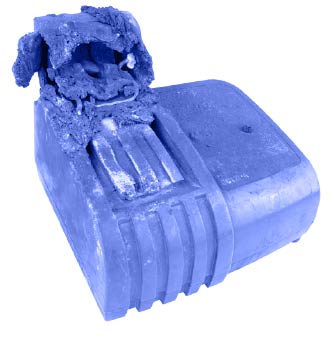Li-Ion batteries have become the industry-standard energy source for cordless power tools. There are numerous beneficial reasons for this – with an accompanying need for safe handling (see PTI’s industry topic, “Safe Handling and Use of Li-Ion Batteries for Power Tools”). Another important safety aspect is thoughtful battery selection.
Reputable Original Equipment Manufacturers (OEM) have their products “listed”. This is a process whereby an independent certification lab (such as Underwriters Laboratories (UL) or Canadian Standards Association (CSA)), tests and evaluates the product for compliance with internationally-accepted safety standards (note “listing” is mandatory for power tools used in work environments governed by OSHA). For cordless power tool “systems” (i.e., a dedicated combination of one-or-more tools / batteries / chargers), these standards evaluate the “system” to ensure the tool, battery, and charger communicate properly to monitor and control critical functions, such as cell balance, energy levels, flow of energy in/out, and temperatures. Only the tool manufacturer is able to obtain “system” certification, because each manufacturer utilizes their own proprietary control circuity to achieve compliance, and the circuitry design is not available to third-party component suppliers.
Be aware that counterfeit batteries – 3rd-party batteries which appear to be OEM – and knock-off batteries are surfacing in the marketplace. Counterfeit batteries are, by definition, illegal, and therefore are not certified by any “recognized” lab – although in some cases the tool may bear a UL or CSA sticker. Because some counterfeit and knock-off batteries can be difficult to distinguish from OEM, the best way to avoid this painful experience is: (1) purchase batteries from authorized dealers and distributors; and (2) if the price sounds too good to be true, it probably is.
Of course, it takes more time, effort, and cost to design, test and “list” a complete power tool system across an entire product portfolio – which is where lower cost counterfeit and knock-off batteries come in. Some knock-off batteries may be “listed” to a general battery safety standard; some are not tested or “listed” to any safety standard. As with any Li-Ion battery that is not intentionally designed to work properly with a specific tool and charger system, the result can be poor performance, shorter life, damage to the tool and charger, the voiding of a tool’s warranty or a battery bursting that may cause a fire or explosion resulting in personal injury and/or property damage. For these reasons, all power tool manufacturers recommend that only OEM batteries be used.
An additional note regarding “remanufactured” batteries (i.e., a situation typically involving opening a sealed “dead” battery pack and manually soldering in individual locally-procured replacement cells): there is no industry or governmental oversight to this practice, and the “listing” on the battery (verifying it meets applicable safety standards), is immediately voided.
So before purchasing a non-OEM battery, be sure to consider all the factors, not just price. Purchasing a battery on-line from an unknown seller without having any verification of the seller’s qualifications or experience, or of the battery’s construction or testing or certification, can leave you with an unsatisfying – and potentially dangerous – experience.
OSHA publishes a list of “Nationally Recognized Testing Laboratories” which are accepted for purposes of product “listing”.
If you have questions regarding whether your battery is a genuine OEM product, contact the power tool manufacturer.

Definitions:
Counterfeit products are fakes or unauthorized replicas of the real product. Counterfeit products are often produced with the intent to take advantage of the superior value and trademark of the imitated product. Counterfeit goods are generally made from lower quality components, in an attempt to sell a cheap imitation of similar goods produced by brands consumers know and trust.
Counterfeiting is a federal and state crime, involving the manufacturing or distribution of goods under someone else’s name, and without their permission. In the power tool industry, knock-off products (also may be referred to as aftermarket/third-party) are any products that are not authorized by the tool manufacturer. They are distinguishable from counterfeit products in that they imitate or copy the physical appearance of other products but do not copy the brand name or logo.
In simple terms, counterfeits and knock-offs are imitations of authentic products manufactured without approval from the owner of the brand. Unfortunately, many well-known and successful companies, spanning just about every industry, fall victim to counterfeiting or knock-off products.